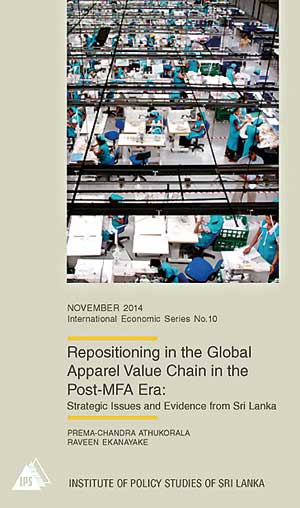Reply To:
Name - Reply Comment
 A recent study published by the Institute of Policy Studies of Sri Lanka (IPS), the country’s apex economic policy research think tank, suggests that apparel is a bundle of differentiated products and not a homogenous commodity as commonly assumed by the trade flow modellers.
A recent study published by the Institute of Policy Studies of Sri Lanka (IPS), the country’s apex economic policy research think tank, suggests that apparel is a bundle of differentiated products and not a homogenous commodity as commonly assumed by the trade flow modellers.
The IPS study titled ‘Repositioning in the Global Apparel Value Chain in the Post-MFA Era: Strategic Issues and Evidence from Sri Lanka’, further highlights that individual exporting countries have room for carving out a niche in specific products.
In the lead-up to the abolition of the Multi-Fibre Arrangement (MFA) quotas in 2005, a widely held view was that in a quota-free global market, large low-cost countries and countries in proximity to the major markets would crowd out export performance of the other developing countries.
However, the study points out that post-MFA, world apparel trade brought in many surprises. While a number of ‘predicted losers’ maintained or increased their market shares, some ‘predicted gainers’ performed poorly.
Research Officer Raveen Ekanayake says, “IPS carried out this study with the aim of broadening the understanding of determinants of the inter-country differences through a case study of the export-oriented apparel industry in Sri Lanka.”
It also points out that the Sri Lankan apparel industry has managed to maintain growth dynamism through specialization in fashion-basic products, in particular intimate apparel (lingerie) and upmarket casualwear.
The study is authored by IPS Research Officer Raveen Ekanayake, together with Prema-chandra Athukorala, Professor of Economics at the Australian National University.
For more details of this publication, visit the IPS website http://www.ips.lk or email [email protected].